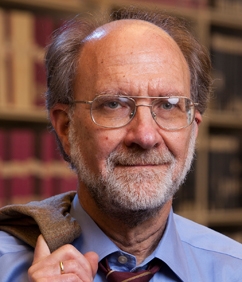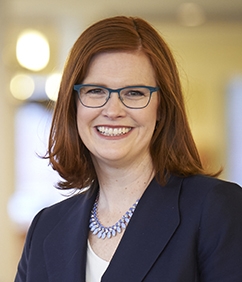American Law Institute members approve Model Penal Code on sexual assault, drafted by Stephen Schulhofer and Erin Murphy
At the annual meeting of the American Law Institute (ALI) in June, members voted to approve Tentative Draft No. 5 of the Model Penal Code: Sexual Assault and Related Offenses, marking a major milestone for the project, because it proposed a final text for the entire code provisions governing sexual assault. The document was the product of a lengthy collaboration between Robert B. McKay Professor of Law Stephen Schulhofer, who served as reporter, and Norman Dorsen Professor of Civil Liberties Erin Murphy, who was associate reporter.
The project reexamined the sexual assault provisions of the ALI’s 1962 Model Penal Code. Schulhofer and Murphy faced the complicated task of incorporating a more modern standard of sexual behavior and consent that looks beyond the previous focus on physical force, without making the model code excessively punitive. Schulhofer and Murphy’s project will end officially once amendments to their draft, already approved by the ALI membership, are greenlit by ALI’s council, but the members’ signoff is a significant hurdle cleared.
Criminal law expert Schulhofer made waves with his book Unwanted Sex: The Culture of Intimidation and the Failure of Law (1998), which argued for breaking traditional rules that limit rape to instances of physical coercion and instead recognizing a right to sexual autonomy, or “the freedom of every person to decide whether or when to engage in sexual relations.” After he was invited to be the reporter for the revisions to Section 213 of the ALI’s Model Penal Code, which covers sexual assault laws, he asked Murphy to be the associate reporter. Murphy had taught criminal law using Schulhofer’s casebook, had sent him notes over the years suggesting changes to its sexual assault components, and had chatted frequently with him about the challenges of successful teaching and productive reform in the area.
Schulhofer and Murphy anticipated spending about three years on the project, but they underestimated slightly. “I was pregnant when the process began,” Murphy explains, “and that child is now entering fourth grade.” After the ALI approved a prospectus in 2012, the two never imagined that they would still be at their task after Murphy’s future daughter had learned long division.
“The previous version of Article 213 was centered on the idea that rape is a crime of violence, generally requiring proof that the perpetrator used physical force,” Schulhofer says, adding, “Over the past two decades, American society has come to understand that this view is much too narrow, and that sexual assault is inherently a crime against the victim’s sexual autonomy.”
The issues surrounding sexual assault laws were complex enough when the project began and quickly became even thornier. At the start, public discourse was focused on Title IX and the problem of campus sexual assault, but relevant issues mushroomed as the national conversation expanded to include #YesAllWomen; #MeToo; Time’s Up; and the worldwide Women’s March in January 2017, the largest single-day protest in US history. At about the same time, heightened public attention to problems of mass incarceration and racially discriminatory law enforcement raised new resistance to any steps that could heighten prosecutorial power or expand the reach of the criminal law.
“It was a project that was always running alongside major social upheavals in the space of gender, women’s rights, sexual violence and the urgency of addressing it,” says Murphy. “It’s been an incredibly tumultuous process…. There were times when I think we both felt like it was not clear that it was going to go through, ever.”
The fact that the Model Penal Code is unusual in the context of the ALI’s stable of projects compounded the challenges of the revision. Most ALI reporters work on Restatements, which function as clear formulations of common law and its statutory elements, and reflect the law as it stands or as a court might state it. On the other hand, the Model Penal Code, originally promulgated in 1962, necessarily had a different ambition, because penal law was, as Murphy puts it, “so incoherent.” Thus, many of the contentious issues that arose during Schulhofer and Murphy’s project had not been previously arbitrated.
“A lot of these debates that in other contexts, when you’re doing a Restatement, get hashed out in the law by legal actors, had to be hashed out by us in the ALI in the first instance,” Murphy explains. That gives the Model Penal Code even greater influence. The majority of states lift large chunks of it as the basis of their statutory code, and the US Supreme Court increasingly relies on it. The knowledge of that influence heightened the urgency of disagreements among the ALI membership.
An immense breakthrough came in 2016 when the members, after protracted debate, finally approved a new definition of “consent,” the principal concept used to gauge the lawfulness of sexual conduct. The revised meaning was a crucial and hard-fought compromise. It centered consent on the concept of willingness, but also specified that neither verbal nor physical resistance is required to establish a lack of consent, that consent can be withdrawn at any time, and that a clear verbal refusal—such as “No”—establishes the lack of consent. In other words, willingness is ordinarily the touchstone of consent, but no one can argue that a person who says “No” is really willing; “no” always means no.
Schulhofer and Murphy give credit to Dean Emeritus Richard Revesz, the current director of the ALI, for his efforts to bring together council members at crucial junctures. Ensuring that particularly difficult points were hammered out behind the scenes before being presented to the wider membership proved key to winning approval of the most recent draft.
“Across the spectrum of opinion among criminal law experts and across much of the left-right political divide, there is a strong consensus that too much behavior is criminalized, that properly prohibited conduct is punished much too severely, and that people of color bear far too much of the brunt of criminal law enforcement,” Schulhofer says. “Yet our project was animated by the conviction that in the area of sexual abuse, the problems run in the other direction—that criminal law has serious gaps, that far too many victims are left without the criminal-law safeguards they desperately need, and that the least advantaged in our society, especially poor people of color, are especially affected by this lack of adequate protection from sexual abuse. We had to find ways to extend the criminal law, and to reach grave sexual abuses that too often benefit from impunity, without contributing to overincarceration, disproportionately severe punishments, racially discriminatory law enforcement, and improper governmental intrusion into genuinely consensual sexual behavior. It wasn’t easy.”
Posted August 24, 2021



